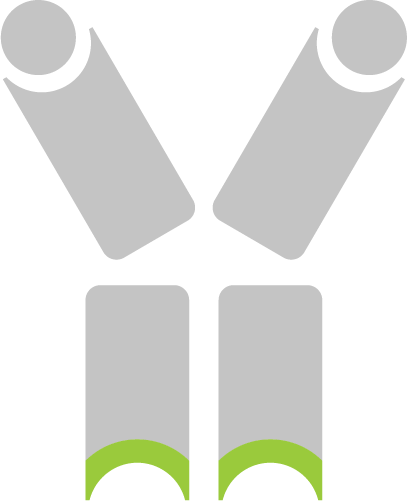Next-Generation Cytokine Therapy
The Diakine™ platform is a next-generation cytokine therapy created to treat inflammatory disease and cancer based on each patient’s individual immune response.
- Anti-inflammatory platform
- Oncology platform
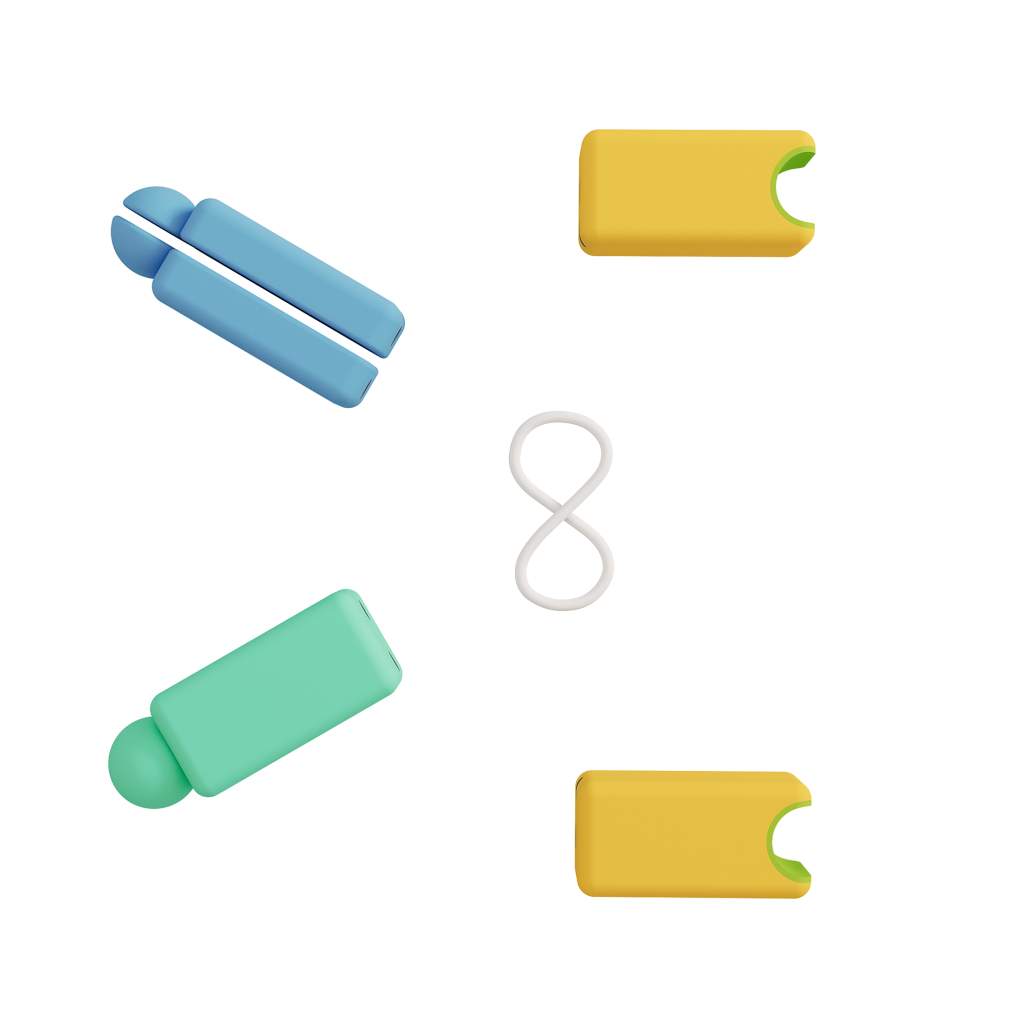

Anti-inflammatory Cytokine
Interleukin-10 is a potent anti-inflammatory
cytokine and the low affinity variant developed
by Deka does not activate T cells
at any dose.

scFv Scaffold
The scFv scaffold is used to enrich inflamed
tissue with the anti-inflammatory cytokines
targeting MAdCAM for Crohn’s and colitis,
VEGFR2 for Psoriasis and Rheumatoid
Arthritis, or CD14 for sepsis.

Targeting System
The complementarity determining regions
(CDR’s) from other antibodies are grafted
into
the scFv scaffold sequence to confer specificity
for targets expressed in inflamed tissue or on
inflammatory cells (e.g., CD14, MAdCAM,
VEGFR2 receptors).

Anti-inflammatory Cytokine
Interleukin-4 is an additional anti-inflammatory
cytokine that specifically suppresses T cell
activation while also suppressing macrophage
and monocyte inflammatory responses.
Linkers
Each protein subunit of the Diakine™ (e.g. interleukin-4,
interleukin-10, variable heavy and variable light chain)
is linked in series as a single chain via simple and flexible
protein linkers. Due to the orientation of the amino and carboxy
termini of each protein, the Diakine™ exhibits
a three-dimensional structure and stability similar to antibodies.
Our Anti-Inflammatory Platform
The immune systems of patients with Crohn’s disease and psoriasis make low amounts of a potent anti-inflammatory cytokine molecule called interleukin 10 (IL-10). Low production of IL-10 likely leads to the development and progression of these specific diseases. Preclinical and clinical studies show that IL-10 treatment is beneficial for both Crohn’s and psoriasis patients.
Interleukin 4 (IL-4) is another anti-inflammatory cytokine, thought to control the cells that drive psoriasis (Th17 T cells). Preclinical and clinical studies have shown that IL-4 treatment controls inflammation in psoriasis patients.
The anti-inflammatory Diakine™ molecules combine these two anti-inflammatory cytokines and targets them to concentrate in inflamed tissue and improve effectiveness.
Our Oncology Platform
The different Diakines™ are composed of a disease-targeting scaffold that links together the combination of cytokines that safely stimulate the immune system to destroy cancer cells.
Cytokines are naturally occurring, small proteins that control the immune system. Using single cytokines to treat cancer can be effective, but is often toxic.
The Diakine™ platform combines the potent anti-cancer function of stimulatory cytokines like interleukin-2, with the inflammation-controlling function of a cytokine like interleukin-10, and targets these cytokines to the tumor, using a human single-chain variable antibody fragment.
By combining the natural functions of two different cytokines, the Diakine™ platform can increase anti-cancer immunostimulatory function while reducing risk of toxic side effects – maximizing the overall potential of the immune system to fight cancer.
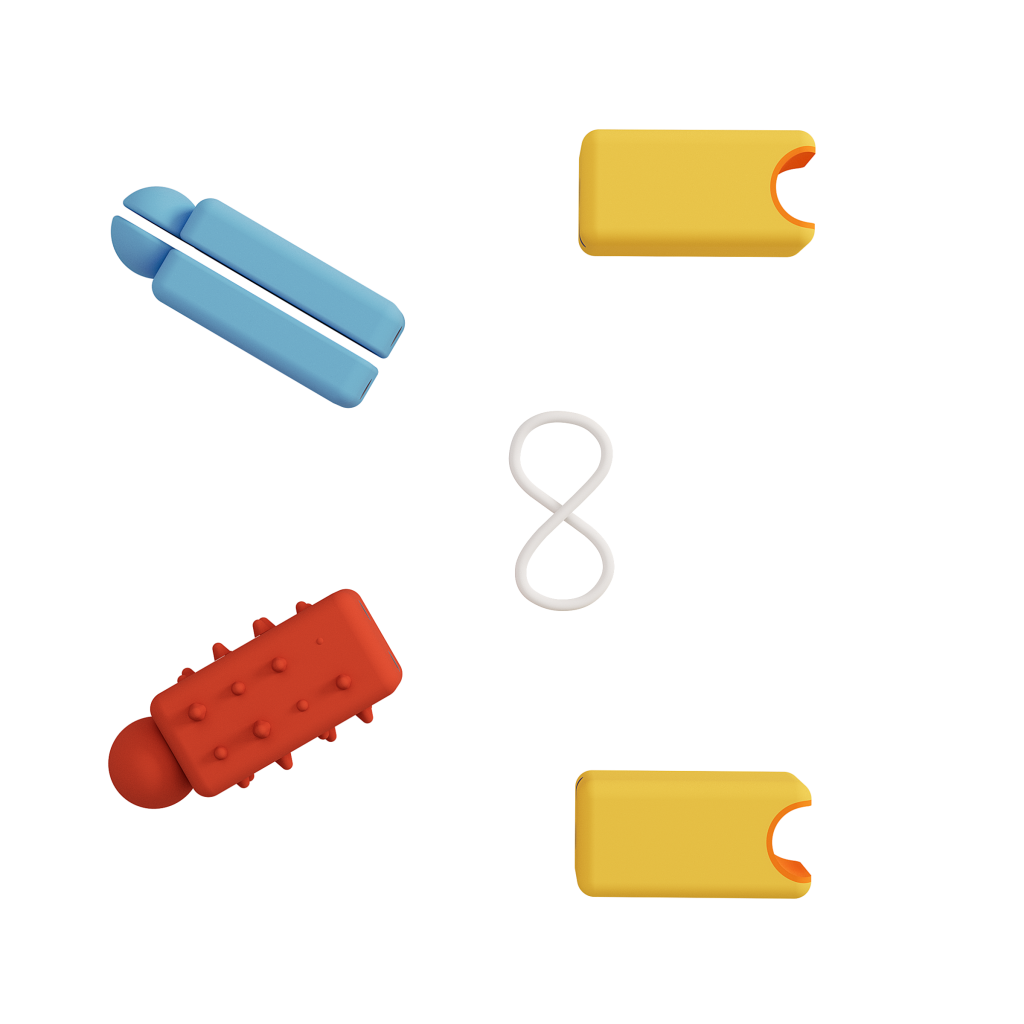

Stimulatory Cytokine
Stimulatory cytokine (e.g., interleukin-2,
interleukin-12, interferon alpha) are small
proteins that can activate immune cells
(e.g., T and NK cells) to selectively destroy
cancer cells, but can also cause toxic
inflammation.

scFv Scaffold
The single chain variable fragment (scFv)
scaffold is used to enrich the DiakineTM in
the tumor microenvironment. The scFv is
comprised of a variable heavy and variable
light chain derived from a human antibody.

Targeting System
The complementarity determining regions
(CDR’s) from other antibodies are grafted
into the scFv scaffold sequence to confer
specificity for tumor antigens
(e.g., EGFR, HER2, VEGFR receptors).

Anti-inflammatory Cytokine
Interleukin-10 is nature’s anti-inflammatory
cytokine, which at certain doses can also
activate anti-cancer T cells. By individually
coupling the stimulatory cytokines with
IL-10, each DiakineTM controls toxic
inflammation, while potently activating
the patient’s immune system to seek out
and destroy tumors.
Linkers
Each protein subunit of the DiakineTM
(e.g. interleukin-2, interleukin-10, variable heavy
and variable light chain) is linked in series as
a single chain via simple and flexible
protein linkers. Due to the orientation of the amino and carboxy
termini of each protein, the DiakineTM exhibits
a three-dimensional structure and stability similar to antibodies.
Our Anti-Inflammatory Platform
The immune systems of patients with Crohn’s disease and psoriasis make low amounts of a potent anti-inflammatory cytokine molecule called interleukin 10 (IL-10). Low production of IL-10 likely leads to the development and progression of these specific diseases. Preclinical and clinical studies show that IL-10 treatment is beneficial for both Crohn’s and psoriasis patients.
Interleukin 4 (IL-4) is another anti-inflammatory cytokine, thought to control the cells that drive psoriasis (Th17 T cells). Preclinical and clinical studies have shown that IL-4 treatment controls inflammation in psoriasis patients.
The anti-inflammatory Diakine™ molecules combine these two anti-inflammatory cytokines and targets them to concentrate in inflamed tissue and improve effectiveness.
Our Oncology Platform
The different Diakines™ are composed of a disease-targeting scaffold that links together the combination of cytokines that safely stimulate the immune system to destroy cancer cells .
Cytokines are naturally occurring, small proteins that control the immune system. Using single cytokines to treat cancer can be effective but is often toxic.
The Diakine™ platform combines the potent anti-cancer function of stimulatory cytokines like interleukin-2, with the inflammation-controlling function of a cytokine like interleukin-10, and targets these cytokines to the tumor, using a human single-chain variable antibody fragment.
By combining the natural functions of two different cytokines, the Diakine™ platform can increase anti-cancer immunostimulatory function while reducing risk of toxic side effects – maximizing the overall potential of the immune system to fight cancer.
Our Precision Medicine
In general, people respond differently to the same cytokine or combinations of cytokines. Drawing from years of research, we can determine which patient will benefit the most from treatment with each Diakine™ using an in vitro assay.
One assay measures how patient’s immune systems make and respond to IL-10 and IL-4 to determine who will benefit the most from treatment with an anti-inflammatory Diakine™. One day, we plan to develop a simple genetic test to select patients in future trials.
For cancer, we have simplified anti-cancer immunity to a different in vitro assay that examines the stimulatory response to an oncology Diakine™. Similar to the assay for anti-inflammatory disease, we are also studying the genetics linked to T cell (anti-cancer cells) responses to one day develop a simple genetics-based companion diagnostic to use in future clinical trials.
Our mission is to sufficiently validate these simple genetic tests based on these assays to enable treating physicians to choose the most effective Diakine™ for each patient.

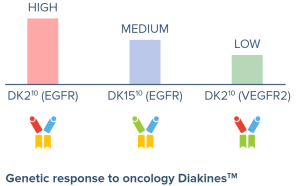
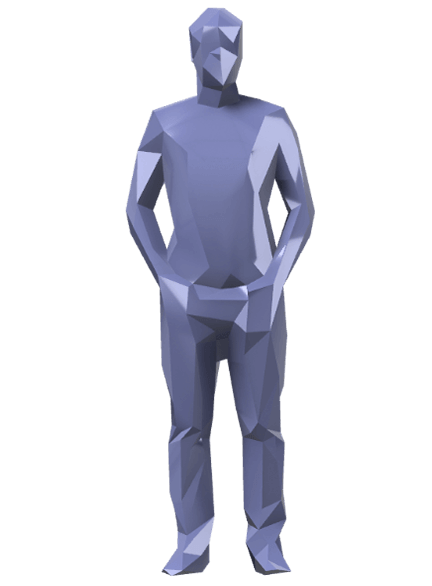
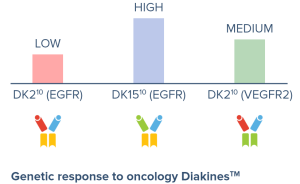

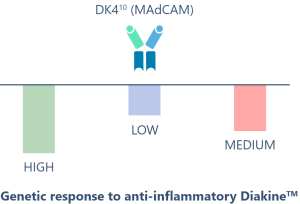
Our Manufacturing
The unique structure of the Diakine™ scaffold provides stability under extreme conditions, like high temperatures and a large pH range. This permits higher manufacturing titers that in turn drive down manufacturing costs to a level that is typically unachievable with single cytokines. The targeting of Diakines™ to the diseased tissue permits less frequent dosing and lower overall dose levels.
Diakine™ therapies are a promising and cost-effective way to treat a wide range of inflammatory diseases and cancer.
Collaboration is part of our ethos.
Deka’s targeted Diakine™ therapies are designed to be customized and provide complementary functions with other established modalities to increase their therapeutic potential.
Similar to the fundamental premise of the Diakine™, we believe that collaboration makes us better, and Deka is always welcoming new partners to advance medicine and improve the lives of patients.








